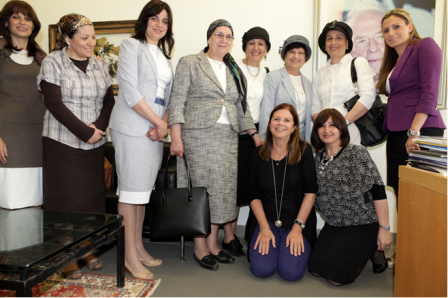Case study: Influential ultra-Orthodox women are change agents for peace

Interpeace releases today a case study titled: Influential ultra-Orthodox Women Are Change Agents for Peace. This case study captures the changes these influential women have undergone and how Interpeace's programme, Base for Discussion (B4D), has contributed to this transformation. It also documets the impact of the work with ultra-Orthodox women at large - both on their community and for the peace process in general.
This case study is a clear demonstration that peace processes cannot stop at the political level. Groups who are usually overlooked, such as the ultra-Orthodox community, but who will have an influence on making or breaking the peace need to be part of the peace process. The challenge often lies in how to engage these groups. The present case study therefore explains how Base for Discussion reached out to the ultra-Orthodox women and helped them become change agents for peace.
In Israel, Interpeace, through its Base for Discussion (B4D) programme works with sectors of Israeli society that have not been involved in the peace process. Women from the ultra-Orthodox community have previously not been involved in peace initiatives, yet they are an influential group which constitutes 61% of this community’s workforce. Recognizing the important role ultra-Orthodox women play in their families and communities, Interpeace started to engage 30 influential women in a programme on conflict resolution. In December 2013, the 30 women graduated with a master’s degree in conflict resolution. The full case study documenting how these 30 women became change agents for peace is available here.
This case study comes at a time when the aftermath of the war in Gaza has made any prospect for peace seem unattainable. By shedding light onto the transformation of this influential group of women,, this case study sends a message of hope, persistence and commitment to peace.
This case study the first in a series of case studies that Interpeace is starting to produce under the title Peacebuilding in Practice. The purpose of these series is to capture Interpeace's results and innovations in its peacebuilding programmes worldwide.























